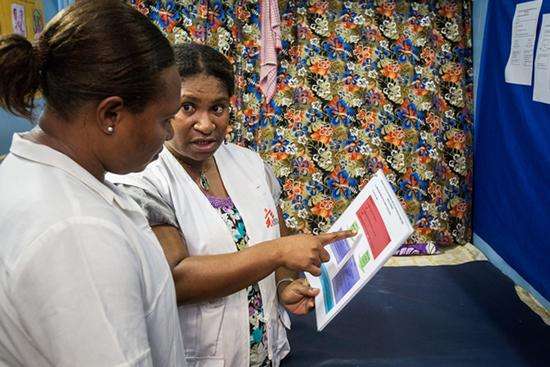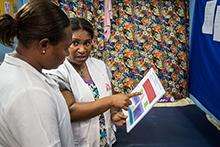A new MSF project in the capital of Port Moresby is bolstering access to quality medical and psychosocial care.
A new Doctors Without Borders/Médecins Sans Frontières (MSF) project in Papua New Guinea’s capital city of Port Moresby is bolstering access to quality medical and psychosocial care for survivors of domestic and sexual violence.
At the 9 Mile Clinic, a health center in a busy Port Moresby settlement area, MSF has begun seeing patients and training local staff to provide integrated care. In the first month the team has already cared for dozens of survivors, and plans are underway to expand the project to more urban health centers and larger family support centers in Port Moresby’s main referral hospitals. This two-tiered approach means that survivors can receive care close to home at the urban health centers and access more in-depth care at the family support centers if needed.
Ultimately, MSF plans to work with health centers and referral hospitals in more remote regions of the country to provide direct care and clinical supervision with the goal of ensuring more survivors of domestic and sexual violence in Papua New Guinea have access to the clinical care they urgently need.
Close to Home
Clinical supervisor Martha Pogo says it is crucial that care is available close to home, because survivors cannot always easily access referral hospitals due to limited transportation options or the severity of their injuries.
“One lady who came in to the clinic had been beaten by her husband when she was two or three months pregnant,” says Martha. “Beaten, kicked, and punched all over, including on the abdomen. She lives just a few houses away, but she couldn’t come in straight away because she had a miscarriage after the incident and she was bleeding. She was so weak, she was crawling. When she could stand up and take one step at a time she walked right into the room and was seen by me. She was grateful she could walk in and get help because she didn’t have the strength to walk to the bus stop.”
Five Essential Services
The Port Moresby project builds on MSF’s experience in Papua New Guinea’s second biggest city, Lae, where more than 13,000 survivors of sexual violence were treated from the end of 2007 to June 2013. Recently, MSF successfully handed over the Lae project to Papua New Guinea’s Department of Health, but will continue to support the project remotely. At the 9 Mile Clinic, Martha is training nursing officers to provide the same minimum package of five essential services that are provided in Lae. This is a simplified treatment protocol that ensures patients receive the most urgent treatments—emergency medical care for wounds; psychological first aid; prophylaxis for HIV and medicine for other sexually transmitted infections (STIs); emergency contraception; and vaccination to prevent Hepatitis B and tetanus—all in one session.
Education is another important service offered at the clinic. For example, many patients are surprised to learn they can prevent HIV if they present within 72 hours of sexual violence. Martha says that knowledge about sexual violence and the importance of medical treatment for survivors is much stronger in Lae, where she worked for a year, than it is in Port Moresby. “It shows how far we’ve come.” However, there is still a long way to go.
Some patients have missed out on urgently needed treatment because of this lack of medical knowledge. Psychosocial nurse Rolling Morgan says one six year-old patient had been sexually abused by a family member a year ago and was still suffering from an untreated STI. After receiving treatment at 9 Mile Clinic her symptoms began to clear within a week.
“For a little girl to have a chronic STI is horrifying and heartbreaking,” says Rolling. “That she was walking around for a year not knowing what had happened to her body, and that the doctors she saw weren’t aware or weren’t understanding, was [disturbing] on many levels. But it was wonderful to be able to . . . help medically.”
A Need to Talk
In addition to providing direct medical care, the 9 Mile Clinic is gaining a reputation as a safe place where survivors can come and talk, whether they suffered sexual violence an hour ago or years ago.
“We’re in a settlement area, not necessarily a safe area, but the clinic is turning into a place where people want to come and share their stories because they know that quality care is being offered,” says Rolling.
Martha Pogo recalls that the first patient the MSF team treated at the clinic was a teenager who had suffered sexual violence two years earlier but had never felt comfortable enough to share her story. “She wasn’t suffering from any medical condition; she just wanted to talk to someone. After two years, she finally felt we were the right people to talk to,” says Martha.
Long-Term Impact
In Port Moresby, MSF is working within existing health facilities to support and train local nursing officers. MSF has appreciated health facilities’ willingness to collaborate and learn new approaches.
Ultimately, the MSF team hopes these nursing officers will be able to train their colleagues to provide the same five essential services.
“It makes me really happy to see these young nurses so passionate about something new to them, and seeing that they’re the ones in charge of it. Hopefully this means that survivors of sexual violence will have access to the medical care they need for a long time to come,” says Rolling.
In addition to the project in Port Moresby, MSF works in Tari running a family support Center. MSF also supports primary and maternal-child health care in the Buin Health Center in Bougainville. MSF began working in Papua New Guinea in 1992.





